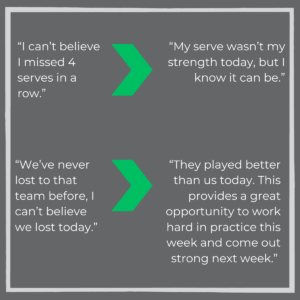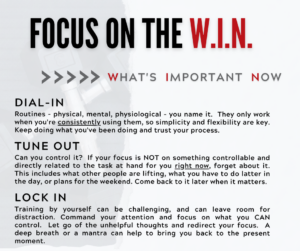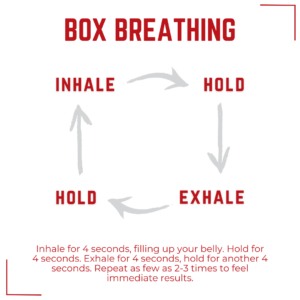You’ve heard it a million times…focus on what you can control.
Those six words serve as a guiding light in both sport and life; after all, where we place our attention is the number one determinant of whether we will find success or not in sport.
Yet it can sometimes be easier said than done to stay locked in on things within our control during competition…or even know what is within our control.
Being cognizant of what is within your control lays the foundation for so many things in sport; letting go of losses and mistakes, moving on from unfortunate outcomes, mentally preparing for competition, and much more.
More importantly, learning to hone in on the controllables in sport will equip you with the skills to combat adversity off the playing field in life for years to come.
WITHIN OUR CONTROL
ATTITUDE
How we approach our attitude before, during, and after competition is critical to developing a strong growth mindset; a skillset that great athletes value and live out. Our attitude and thoughts are intertwined and naturally, a negative attitude will lead to negative thoughts and vice versa.
It’s okay to be frustrated when things go wrong and important to acknowledge the feelings and thoughts that you may have. Yet our thoughts moving forward can greatly affect our attitude.
A bad attitude is often rooted in a poor performance or negative outcome and thoughts such as “I can’t believe I lost!” or “I played so poorly” are often present. Simply working toward rephrasing those negative thoughts into opportunities can go a long way in shifting an athlete’s mindset or attitude. A few examples are provided below.

FOCUS
As mentioned above, where we place our attention (our focus) is the number one determinant of success in sport. That being said, placing our focus on things within our control is absolutely critical to peak performance. Shifting focus to things within our control after miscues, mistakes, and outcomes out of our control is even more important.
Let’s say you miss a free throw; as frustrating as it may be, there is nothing that you can do to change the outcome. However, you can control how you respond and move forward. When adversity hits or when you find yourself focusing on things outside of your control, remind yourself of the acronym W.I.N.; what’s important now.
For example, after that missed free throw, W.I.N. could be hustling back down the court to play good defense or leaning on a specific breathing technique.

EFFORT
We may not be able to control the outcomes of competition, but we can always control our effort. Strong effort naturally maximizes our chances of obtaining favorable outcomes but most importantly, instills strong habits and a valid feeling of satisfaction following competition.
BREATHING
Sport often presents moments of stress, anxiousness, and adversity. One of the best ways to work through those moments is to practice breathing exercises. Breathing exercises help us calm down, refocus, and lock in on what’s important in the present moment.
One of the most popular breathing exercises is box breathing. See below how to practice box breathing.

PREPARATION
Outcomes are out of our control and some days you may just not have your “A game.” However, practicing excellent preparation prior to practice and competition gives us the best chance to receive favorable results and play to our potential.
Preparation can include health habits such as getting a good night’s sleep, eating well, and hydrating. It can also include actions right before competition such as meditation and writing down goals.
Consistency is everything when it comes to preparation; come up with and write down a preparation routine that spans the night before competition to the moments leading up to it and to yourself accountable.
BEHAVIOR/SPORTSMANSHIP
Sport brings out emotion, and that can be an excellent thing. However, it’s always important to be cognizant of our behavior toward others, sportsmanship, and our own body language.
“Body language communicates a message to everyone around us” Premier’s Dr. Chrissy Holm Haider says. “Ask yourself, what message do you want to send to your teammates, coaches, and opponents?”
It’s okay to feel emotions of stress and frustration. Yet as mentioned earlier, it’s important to turn the page and portray yourself in a way that you want to be perceived by those around you.
OUT OF CONTROL
INJURY
Dealing with injuries can be very frustrating. Spending time dwelling on an injury is not going to help you get better because it is out of your control. The best thing to do is focus on what you can control. You can watch film, do rehab, support your teammates, etc. All of these things are within your control and will ensure you are prepared for when you can return from your injury.
WEATHER
Bad weather can be a difficult obstacle when playing outdoor sports. Letting the weather dictate how you play/act is not going to be beneficial. Everyone has to play in the same conditions so instead of focusing on the weather, focus on what is within your control and how you can perform your best regardless of the climate.
OUTCOME
Nobody can control the outcome of the game before it happens. Worrying about something that hasn’t happened yet restricts you from being present. Being present and focusing on what you can control in the moment is what maximizes your focus/performance and will help get you to the outcome you want.
COACHES
We’ve all seen a coach yell at their players from time to time. Being yelled at may make you upset and make it difficult to manage your emotions. However, it’s not beneficial allocating our focus towards the thoughts and behaviors of others. Instead, focus on how you would/will respond in situations when receiving feedback.
We also cannot control a coach’s decision on playing time or minutes. Frustrated with a lack of playing time? Hone in on things within your control such as open communication, hard work, attitude, and goal-setting.
PARENTS
Most athletes want to make their parents proud. Yet you cannot control the actions or words of your parents or other parents. While we cannot control our parents, we can control practicing open communication about how we’re feeling, how we can ask our parents to best support us, and what our goals and aspirations are.
FANS
We’ve all competed in front of fans or spectators who have distracted us. As frustrating as it may be, we cannot control what people in the stands are saying/yelling and allocating our focus toward them does no good.
Like any other situation where you may become distracted, remember the W.I.N. when you notice yourself focusing on fans.
LUCK
Luck is a part of all sports at the levels…sometimes for the better, sometimes for the worse. You may play the best game or match of your life but lose because of a lucky shot or pass. As frustrating as it may be, there’s no way that you can control lucky outcomes that your opponent has…or that you may have.
Coming to terms with this is important and a reminder that we cannot control outcomes; we can only control the steps we take to put ourselves in the best position to find success and fulfillment in sport.